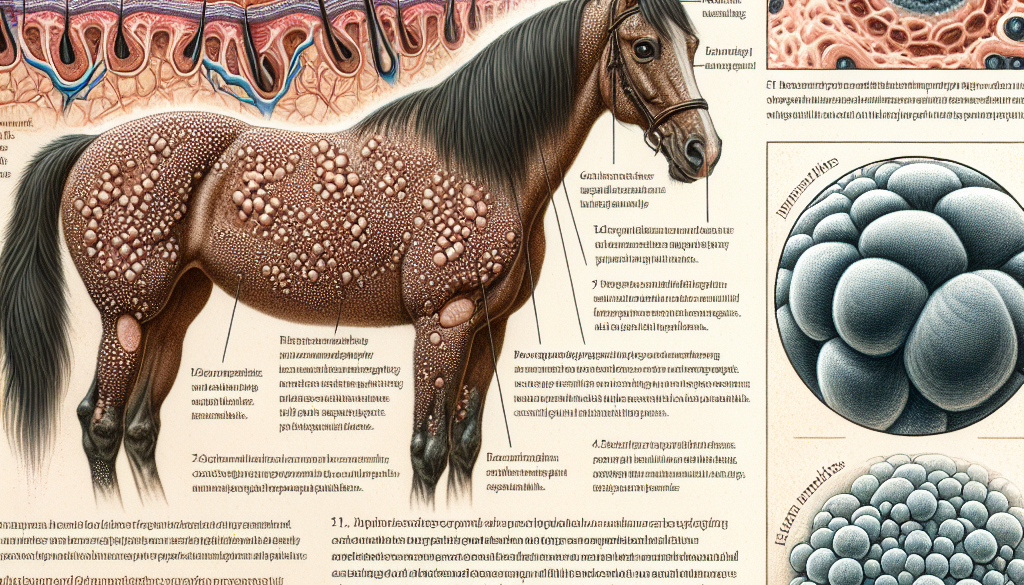Protein Bumps on Horses: Health Considerations
-
Table of Contents
- Protein Bumps on Horses: Understanding Health Implications
- Identifying Protein Bumps on Horses
- Causes and Types of Protein Bumps
- Treatment Options for Protein Bumps
- Preventive Measures and Health Management
- Case Studies and Statistics
- Conclusion: Key Takeaways for Horse Health
- ETprotein: Your Partner in Equine Nutrition
Protein Bumps on Horses: Understanding Health Implications

Equine health is a complex field that requires attention to various signs and symptoms that may indicate underlying health issues. One such concern that horse owners and veterinarians often encounter is the presence of protein bumps on horses. These bumps, medically referred to as equine sarcoids or granulomas, can range from benign growths to more serious conditions that require immediate attention. This article delves into the health considerations associated with protein bumps on horses, exploring their causes, types, treatment options, and preventive measures.
Identifying Protein Bumps on Horses
Protein bumps on horses can manifest in various forms and locations on the animal’s body. They are typically characterized by raised nodules or lumps that can be felt under the skin. These bumps may be singular or multiple, and their size can vary from small, pea-sized nodules to larger masses. It’s crucial for horse owners to regularly check their horses for any unusual growths or swellings and to consult a veterinarian if any are found.
Causes and Types of Protein Bumps
Several factors can lead to the development of protein bumps on horses. Some of the most common causes include:
- Insect Bites: Bites from flies and other insects can cause an allergic reaction, leading to the formation of bumps.
- Allergic Reactions: Horses can develop allergies to environmental factors, such as pollen or certain feeds, resulting in skin reactions.
- Infections: Bacterial or fungal infections can cause abscesses or granulomas.
- Parasites: Parasitic infestations, such as those caused by mites or lice, can lead to skin irritation and bump formation.
- Tumors: Both benign and malignant tumors can appear as bumps on the skin.
It’s important to accurately diagnose the type of protein bump to determine the appropriate course of action. A veterinarian may perform a biopsy or other diagnostic tests to identify the nature of the bump.
Treatment Options for Protein Bumps
The treatment for protein bumps on horses depends on the underlying cause. Some bumps may resolve on their own without intervention, while others may require medical treatment or surgical removal. Treatment options include:
- Topical Medications: For allergic reactions or minor infections, topical creams and ointments may be prescribed.
- Systemic Treatments: In cases of more severe infections or parasitic infestations, oral or injectable medications may be necessary.
- Surgery: Surgical removal may be recommended for large or troublesome bumps, particularly if they are tumors.
- Cryotherapy: Freezing the bump with liquid nitrogen can be an effective treatment for certain types of growths.
- Laser Therapy: Laser treatment can be used to remove or reduce the size of some bumps.
It’s essential to follow the veterinarian’s recommendations and to monitor the horse’s condition closely during and after treatment.
Preventive Measures and Health Management
Preventing protein bumps on horses involves a combination of good management practices and proactive health care. Some preventive measures include:
- Insect Control: Implementing an effective insect control program can reduce the risk of bites and subsequent allergic reactions.
- Regular Grooming: Keeping the horse’s skin clean and well-groomed can help prevent infections and parasitic infestations.
- Proper Nutrition: A balanced diet can support the horse’s immune system and overall skin health.
- Vaccinations: Keeping up to date with vaccinations can prevent certain diseases that may lead to bump formation.
- Regular Veterinary Check-ups: Routine veterinary examinations can help catch and address any issues early on.
By maintaining a clean environment, monitoring the horse’s health, and addressing any concerns promptly, horse owners can significantly reduce the likelihood of protein bumps developing.
Case Studies and Statistics
While specific statistics on the prevalence of protein bumps in horses are not readily available, numerous case studies highlight the importance of early detection and treatment. For example, a study published in the Journal of Equine Veterinary Science reported successful treatment of equine sarcoids using a combination of surgical excision and chemotherapy. Another case study demonstrated the effectiveness of immunotherapy in treating granulomas caused by insect hypersensitivity.
These examples underscore the need for individualized treatment plans based on the specific type and cause of the protein bump.
Conclusion: Key Takeaways for Horse Health
Protein bumps on horses are a common concern that can have various underlying causes. Identifying the type of bump is crucial for determining the appropriate treatment. Preventive measures, such as insect control and regular veterinary care, play a vital role in maintaining equine health. Horse owners should remain vigilant and consult with a veterinarian if they notice any unusual growths on their horses.
For those looking to support their horse’s health through nutrition, ETprotein offers a range of high-quality protein products that can be beneficial for equine diets. Their plant-based proteins are non-GMO and allergen-free, making them a safe choice for horses with dietary sensitivities.
ETprotein: Your Partner in Equine Nutrition
About ETprotein:
ETprotein, a reputable plant protein vegan protein Chinese factory manufacturer and supplier, is renowned for producing, stocking, exporting, and delivering the highest quality organic bulk vegan protein and plant proteins. They include Organic rice protein, clear rice protein, pea protein, clear pea protein, watermelon seed protein, pumpkin seed protein, sunflower seed protein, mung bean protein, peanut protein etc. Their offerings, characterized by a neutral taste, non-GMO, allergen-free attributes, cater to a diverse range of industries. They serve nutraceutical, pharmaceutical, cosmeceutical, veterinary, as well as food and beverage finished product distributors, traders, and manufacturers across Europe, USA, Canada, Australia, Thailand, Japan, Korea, Brazil, and Chile, among others.
ETprotein specialization includes exporting and delivering tailor-made protein powder and finished nutritional supplements. Their extensive product range covers sectors like Food and Beverage, Sports Nutrition, Weight Management, Dietary Supplements, Health and Wellness Products, and Infant Formula, ensuring comprehensive solutions to meet all your protein needs.
As a trusted company by leading global food and beverage brands and Fortune 500 companies, ETprotein reinforces China’s reputation in the global arena. For more information or to sample their products, please contact them and email sales(at)ETprotein.com today.












